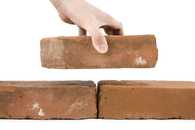weekly column
|
Each week, find a commentary on something connected to verses of Torah or another source of wisdom
|
|
Each week, find a commentary on something connected to verses of Torah or another source of wisdom
|
 They said one to the other, “Let’s make bricks and bake them solid.” And they had bricks for stone and tar for mortar. Genesis 11:3 New technology is always a mixed blessing. Necessity may be the mother of invention, but it does not limit the use of the invention to take care of mom. In addition to the need technology addresses, two things are certain: it will be used for purposes other than intended, and some segment of the population will oppose it altogether. The ancient Babylonians did not have the stone quarries of lands to their west. At some point, they invented a technique for makes bricks out of the abundant mud and secured them to each other with the tar that bubbled up from the oil deposits underground. The report in this section of Genesis begins with a kind of surprise and wonder at the innovation (and explains, in Hebrew, how certain words came to their meanings). But this new technology leads the residents of Babel to overreach, and they are punished with a “confusion of languages” (babble?). The technology meant to unite them leads to their undoing. In fact, a Jewish story contends that they were so enamored of the literal heights to which they could scale that if a worker on the tower fell and was killed, nobody paid any attention. But if a brick dropped, a wail went out at the delayed progress. Where was Samuel Gompers when he was needed? Throughout history, this tension between technological innovation and the belief that things are just fine the way they are is dependable. When writing began to replace oral tradition, there was resistance. When the printing press began to replace the scribe, there was alarm. When digital publishing began to replace paper, there was a sense of doom. And, frankly, the predictions of the nay-sayers were correct. The flexibility of an oral tradition disappeared when the authorized version appeared. A person could sit alone in his or her home and come up with any interpretation of a document when the authorized versions were widely available. The accessibility of wide distribution without significant cost or skill has allowed quantity to overwhelm quality. And throughout history, technological innovation has served both a higher purpose and baser motivations. Atomic energy, automated factories, broadcasting and recording, social media and so many other creations large and small have enhanced the quality of life and threatened not just its quality but even its existence at the same time. Technology is neutral; its use is not. And that is the point, I think, of this fantastical little story about how different languages came to be. It isn't about the technology of brick-making and masonry. It is about what people do with it. Even way back whenever, people recognized the absurdity of building a stairway to heaven. The punishment meted out to the people attempting the Tower of Babel was a caution about human behavior, not about the technology. The misuse of technology is very much on our minds these days as well. Either Russians or some social recluse with a laptop supposedly messed with our elections. Emails may have caused the political downfall of one candidate, just as lurid photos caused the downfall of another. 140-character bons mots convey the opinions and priorities of the next leader of the free world instead of considered and informed statements. I get an email almost every day from an organization that believes the most dangerous people in the world are young Muslim men with access to the internet. A compassionate and exceedingly wise teacher of mine is being bullied by comments from people who consider his compassion to be a form of betrayal. And a friend and rabbinic colleague who fled the stress of toxic face-to-face interactions in order to live a quieter life in big sky country has been subjected to disdain, harassment and endangerment because of the electronic reach of a malicious bigot who no longer has to rely on a mimeograph machine and the US Postal Service. These things are not the fault of technology any more than the bricks were at fault for the decisions of the bricklayers. These technologies – all of them – were invented for the benefit of our world. The people who misuse them are the one who squander the gifts. One of my favorite jokes is about a woman who pokes and prods every orifice of a fresh roaster before handing it back to the butcher. "I don't like it," she says. He replies, "Lady, could you pass a test like that?" So before you get too smug about your use of technology, check the history of your browsing.
0 Comments
Leave a Reply. |
Archives
October 2023
Categories |